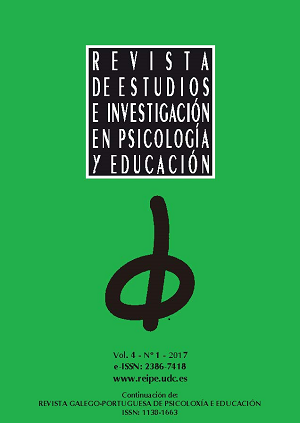Family Stress and Satisfaction in college students: does parental divorce matter?
Main Article Content
Abstract
Keywords:
Downloads
Article Details
References
Arnett, J. J. (2008). Adolescencia y adultez emergente. Un enfoque cultural. México. https://www.academia.edu/11981121/Adolescencia_y_Adultez_Emergente_Un_Enfoque_Cultural_-_Jeffrey_Jensen_Arnett_-_3ed
Barkey, A.D. (2015). The effect of an early childhood divorce on self-esteem, relationship quality, and college adjustment in college students (Tesis doctoral). University of Hartford, West Hartford (Connecticut).
Capano, A., & Pacheco, A. (2014). Stress and domestic violence: A study in significant adults to children and adolescents. Prensa Médica Latinoamericana, VIII(1), 31-42.
Charles, Z.C., Dinwiddie, G., & Massey, S.D. (2004). The continuing consequences of segregation: family stress and college academic performance. Social Science Quarterly, 85(5), 1353-1373. https://dx.doi.org/10.1111/j.0038-4941.2004.00280.x
Cohen, J. (1988). Statistical power analysis for the behavioral sciences (2nd Ed.). Hillsdale, Nueva Jersey: Erlbaum.
Connel, B., Hayes, D., & Carlson, M. (2015). Relation between parental divorce and adjustment in college students. Journal of Divorce & Remarriage, 56(4), 336-345. https://dx.doi.org/10.1080/10502556.2015.1025756
Cummings, E. M., & Davies P. T. (2010). Marital conflict and children. An emotional security perspective. Nueva York: Guildford Press.
Durlak, J. A. (2009). How to select, calculate and interpret effect sizes. Journal of Pediatric Psychology, 34(9), 917–928. https://dx.doi.org/10.1093/jpepsy/jsp004
Fundación BBVA. Departamento de Comunicación (2006). Estudio de la Fundación BBVA sobre los universitarios españoles. Recuperado de: http://www.unizar.es/ice/images/stories/calidad/Informe%20BBVA.pdf
Gager, C.T., Yabiku, S.T., & Linver, M.R. (2016). Conflict or Divorce? Does Parental Conflict and/or Divorce Increase the Likelihood of Adult Children's Cohabiting and Marital Dissolution? Marriage & Family Review, 52(3), 243-261. https://doi.org/10.1080/01494929.2015.1095267
Guillén, R., Aliaga, K., Quispe, F., Nicolás, Y., Solís, R., Robles, Y., Valencia, E., Vargas, E. & Vilchez, L. (2013). Adaptación de la Escala de Satisfacción Familiar por Adjetivos (ESFA) en universitarios de Lima metropolitana. Anales de Salud Mental, 27(2), 14-21.
González, N., Valdez, J. & Zavala, Y. (2008). Resiliencia en adolescentes mexicanos. Enseñanza e Investigación en Psicología, 13(1), 41-52.
Hill, R. (1986). Life cycle stages for types of single parent’s families: of family development theory. Family Relation, 35(1), 19-30.
Kennedy, E.G. (1989). Differences among college student’s perceptions of family satisfaction. Perceptual and motor skills, 68, 129-130.
López-Larrosa, S. (2009). El sistema familiar ante el divorcio: factores de riesgo y protección y programas de intervención. Cultura y Educación, 21, 391-402. https://doi.org/10.1174/113564009790002436
Luca, B.A., & Laca, A.F. (2014). Análisis factorial confirmatorio de la escala de satisfacción con la vida de familia (ESFV) en adolescentes de secundaria y bachillerato. Psicogente, 17(31), 226-240.
Olson, D. H. (2011). FACES IV and the Circumplex Model: Validation study. Journal of Marital and Family Therapy, 37(1), 64-80. http://dx.doi.org/10.1111/j.1752-0606.2009.00175.x
Olson, D.H. & Wilson, M. (1982). Family Satisfaction. En D.H. Olson, H.I. McCubbin, H. Barnes, A. Larsen, M. Muxen & M. Wilson (Eds.), Family inventories: inventories used in a national survey of families across the family life cycle (pp.43-49). St. Paul, MN: University of Minnesota.
Sanz, M. (2003). El funcionamiento familiar de los drogodependientes a lo largo de un tratamiento (Tesis doctoral). Universidad de Deusto, Bilbao.
Sanz, V. (2008a). Escala de Estrés Familiar (FSS, Family Stress Scale). En Equipo EIF (Ed.), Manual de instrumentos de evaluación familiar (pp. 101-107). Madrid: Editorial CCS.
Sanz, V. (2008b). Escala de Satisfacción Familiar (FsfS. Family Satisfaction Scale). En Equipo EIF (Ed.), Manual de instrumentos de evaluación familiar (pp. 69-79). Madrid: Editorial CCS.
Sanz, M., Iraurgi, I & Martínez-Pampliega, A. (2002). Evaluación del funcionamiento familiar en toxicomanías: Adaptación española y características de adecuación métrica del FAP-FACES IV. En I. Iraurgi & F. Gonzáles-Saiz (Eds.), Instrumentos de evaluación en drogodependencias (pp. 403-434). Madrid: Aula Médica.
Williams, M.A. (2012). Exploring the relationship between gratitude and family satisfaction among college students (Tesis doctoral). The Patton College of Education of Ohio University, Athens.



